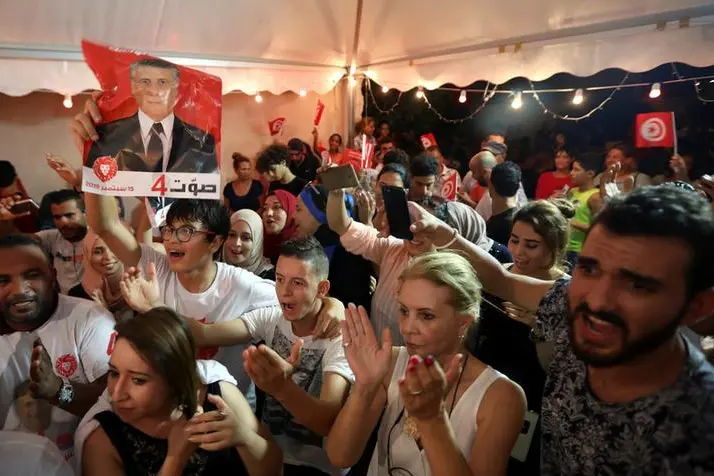PHOTO
TUNIS- Tunisian voters appear to have up-ended their nation's politics in Sunday's presidential election, rejecting established leaders for two outsiders with 39% of votes counted.
Kais Saied, a conservative law professor, and Nabil Karoui, a media magnate held in detention since last month, have an apparently solid lead over a moderate Islamist candidate and seem set to advance to a runoff vote next month.
Eight years after Tunisians staged the first of the Arab Spring revolutions to overthrow autocratic rule, Sunday's vote represents a sharp rebuke of democratically elected governments that struggled to improve living standards or end graft.
"He will fight corruption and establish a just state and continue the process of the revolution," said fishmonger and Saied voter Noureddine el-Arabi, proudly showing the inky forefinger that proved he had voted.
Karoui has for years used his Nessma television station and the charity he founded after his son died to present himself as a champion of the poor and a scourge of government, while his critics describe him as an ambitious, unscrupulous, populist.
He denies all claims of wrongdoing against him, including old tax evasion and money laundering charges which kept him in jail on election day, calling them an undemocratic plot.
"We hope that Karoui will keep his promises and keep helping us like he did in recent years (with his charity)," said a woman at Tunis fishmarket, who did not want to be named.
His wealth and massive electoral organisation stand in sharp contrast to Saied, who spent so little on his campaign that Tunisians joke it cost no more than a coffee and packet of cigarettes.
Saied, who speaks in public in formal Arabic as if in a faculty meeting, drives an old car and wants to remain in his humble house if elected rather than move into the luxurious presidential palace at Carthage.
A social conservative who backs restoring the death penalty and rejects equal inheritance for men and women, Saied's main focus is decentralisation in a country where politicians in the capital have traditionally dominated.
With 39% of votes counted, Saied was on 19%, Karoui was in second place with 15% and the moderate Islamist Ennahda party candidate Abdelfattah Mourou was on 13%, the official figures showed, proportions that now appear to be holding.
ISLAMISTS, POPULISTS, ESTABLISHMENT
In a radio interview on Sunday, Saied described his lead as "like a new revolution", a reference to Tunisia's 2011 uprising that brought in democracy and set off the Arab Spring revolts elsewhere.
Tunisia's prime minister, two former prime ministers, the defence minister and a former president were among the political heavyweights competing in a field of 26 candidates.
"We received the message sent by the Tunisian people," Prime Minister Youssef Chahed said late on Sunday, conceding defeat.
An official in Ennahda, seen as Tunisia's main anti-establishment force before it joined successive recent governments, said it would now focus on the Oct. 6 election for parliament, which wields more power than the presidency.
With a low turnout of 45% - down from 63% in 2014 - the result underscored widespread frustration over the sluggish economy, high unemployment, poor public services and persistent corruption.
Karoui, in a statement read by his wife after exit polls were published, said result was a message to a political elite that he accuses of using the judicial process to try to silence him.
Tunisia's electoral commission has said he can stay in the race so long as he has not been convicted, though no date is set for a final verdict.
Courts have ruled that he must stay in custody while facing the charges, despite complaints by election monitors that this prejudices his chances. His opponents have said his use of his unlicensed television station should itself disqualify him.
Legal questions over whether he could take the oath of office while in detention, or whether presidential immunity would protect him, are unsettled. A constitutional court to address such issues has not yet been set up.
"You punished those who tried to steal the votes by putting me in prison without trial, and who prevented me from speaking to people in the campaign," Karoui's Sunday night message said.
(Reporting by Tarek Amara and Angus McDowall; Editing by Angus MacSwan and Giles Elgood) ((angus.mcdowall@thomsonreuters.com; Reuters Messaging: angus.mcdowall.thomsonreuters.com@reuters.net))





















